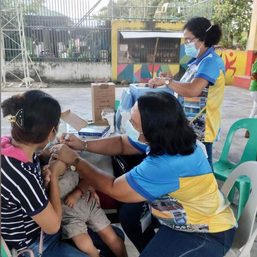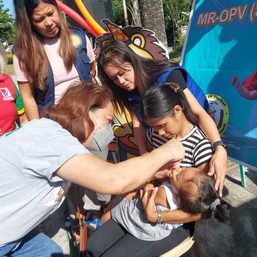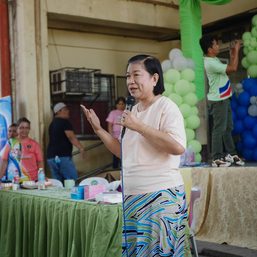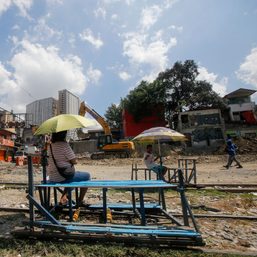SUMMARY
This is AI generated summarization, which may have errors. For context, always refer to the full article.

MANILA, Philippines – The Philippines on Wednesday, June 21, launched its vaccination program for COVID-19 bivalent boosters, which offer protection against the highly transmissible Omicron variant.
President Ferdinand Marcos Jr. joined the launch in the Philippine Heart Center (PHC) in Quezon City, where 2,900 PHC workers were expected to be vaccinated. Health Secretary Ted Herbosa was also vaccinated on Wednesday.

The Philippines received more than 390,000 doses of the COVID-19 vaccines from the Lithuanian government, Herbosa said, adding that more doses are expected to arrive.
The bivalent vaccines were first released in the United States around end-2022. These boosters were reformulated to target both the original strain of the coronavirus, and the more contagious Omicron variant, which emerged in November 2021.
On March 31, the Department of Health (DOH) issued a memorandum on the management and administration of donated bivalent vaccines. Like in previous vaccination campaigns, the groups that will be given priority for the first jabs are healthcare workers and senior citizens, who are considered part of the most vulnerable population.
Meanwhile, an individual may be vaccinated with a bivalent vaccine at least four to six months after their last booster vaccination.
This Omicron variant drove the record-high infections that plagued the Philippines in January 2022. Its subvariants have driven surges of infections around the world.
“The Department of Health urges everyone, starting with our healthcare workers and senior citizens, to strengthen [their] immunity against COVID-19 by getting these bivalent boosters,” said Herbosa.
The President acknowledged a higher level of protection against COVID-19 due to earlier vaccinations, but noted that the emergence of new subvariants called for a reexamination of what the country needed to do to protect its people.
“Although [for] the general populace – symptoms have lessened, hospitalizations have lessened, even the incidence of mortality has lessened. However, there is a distinct group that is highly vulnerable to these new variants, and that is what we are vaccinating for. That vulnerable group [includes] those with severe comorbidities, and those who are senior,” Marcos said.
“We must not let our guard down,” he added.
On May 5, the World Health Organization declared an end to COVID-19 as a global health emergency. The lifting of the emergency status is a sign of the world’s progress in fighting the disease, but COVID-19 is here to stay, the WHO has said, even if it no longer represents an emergency.
Meanwhile, in the Philippines’ latest COVID-19 case bulletin, the country recorded 4,281 new cases from June 12 to June 18, yielding an average of 612 new cases per day. Fifty-seven of these were severe and critical, while one death was recorded.
As for vaccination, the Philippines has reached more than 100% of its target population, with over 78.4 million who have received their primary doses. However, only 23.8 million Filipinos have received their booster shots.
The Philippines has detected the presence of several Omicron subvariants among cases in the country, including XBB, XBB 1.5, and BA.2.75. The most recent subvariant to be detected is FE.1, wherein one case was added to the DOH’s biosurveillance report on May 29 to June 12. – with reports from Bea Cupin and Reuters/Rappler.com
Add a comment
How does this make you feel?


![[Time Trowel] Evolution and the sneakiness of COVID](https://www.rappler.com/tachyon/2024/02/tl-evolution-covid.jpg?resize=257%2C257&crop=455px%2C0px%2C1080px%2C1080px)







There are no comments yet. Add your comment to start the conversation.